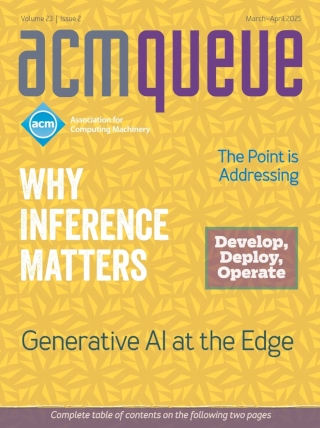
A Bigot by Any Other Name...:
Are you an Open Source Bigot?
I’ve been responsible for hiring many software engineers. I tend to ask lots of elaborate technical questions so I can really get to know how the candidate thinks and works with me while solving hard problems. QA engineers will appreciate this one (it’s a “negative test” for intellectual honesty): “Explain the relative strengths and weaknesses of FreeBSD, Windows NT, Solaris, and Linux.”
A Conversation with Sam Leffler:
A Unix and BSD pioneer discusses the open source movement.
The seeds of Unix and open source were sown in the 1970s, and Sam Leffler was right in there doing some of the heaviest cultivating. He has been actively working with Unix since 1976 when he first encountered it at Case Western Reserve University, and he has been involved with what people now think of as open source, as he says, “long before it was even termed open source.” While working for the Computer Systems Research Group (CSRG) at the University of California at Berkeley, he helped with the 4.1BSD release and was responsible for the release of 4.2BSD. He has contributed to almost every aspect of BSD systems, most recently working (again) on the networking subsystem.
Is Open Source Right for You?:
A fictional case study of open source in a commercial software shop
The media often present open source software as a direct competitor to commercial software. This depiction, usually pitting David (Linux) against Goliath (Microsoft), makes for fun reading in the weekend paper. However, it mostly misses the point of what open source means to a development organization. In this article, I use the experiences of GizmoSoft (a fictitious software company) to present some perspectives on the impact of open source software usage in a software development shop.
Open Source to the Core:
Using open source in real-world software products: The good, the bad and the ugly
The open source development model is not exactly new. Individual engineers have been using open source as a collaborative development methodology for decades. Now that it has come to the attention of upper and middle management, however, it’s finally being openly acknowledged as a commercial engineering force-multiplier and important option for avoiding significant software development costs.
TCP Offload to the Rescue:
Getting a toehold on TCP offload engines—and why we need them
In recent years, TCP/IP offload engines, known as TOEs, have attracted a good deal of industry attention and a sizable share of venture capital dollars. A TOE is a specialized network device that implements a significant portion of the TCP/IP protocol in hardware, thereby offloading TCP/IP processing from software running on a general-purpose CPU. This article examines the reasons behind the interest in TOEs and looks at challenges involved in their implementation and deployment.
There’s No Such Thing as a Free (Software) Lunch:
What every developer should know about open source licensing
The licenses for most software are designed to take away your freedom to share and change it. By contrast, the GNU General Public License is intended to guarantee your freedom to share and change free software to make sure the software is free for all its users. So begins the GNU General Public License, or GPL, which has become the most widely used of open source software licenses. Freedom is the watchword; it’s no coincidence that the organization that wrote the GPL is called the Free Software Foundation and that open source developers everywhere proclaim, “Information wants to be free.”
Desktop Linux: Where Art Thou?:
Catching up, meeting new challenges, moving ahead
Linux on the desktop has come a long way - and it’s been a roller-coaster ride. At the height of the dot-com boom, around the time of Red Hat’s initial public offering, people expected Linux to take off on the desktop in short order. A few years later, after the stock market crash and the failure of a couple of high-profile Linux companies, pundits were quick to proclaim the stillborn death of Linux on the desktop.
From IR to Search, and Beyond:
Searching has come a long way since the 60s, but have we only just begun?
It’s been nearly 60 years since Vannevar Bush’s seminal article, ’As We May Think,’ portrayed the image of a scholar aided by a machine, “a device in which an individual stores all his books, records, and communications, and which is mechanized so that it may be consulted with exceeding speed and flexibility.”



